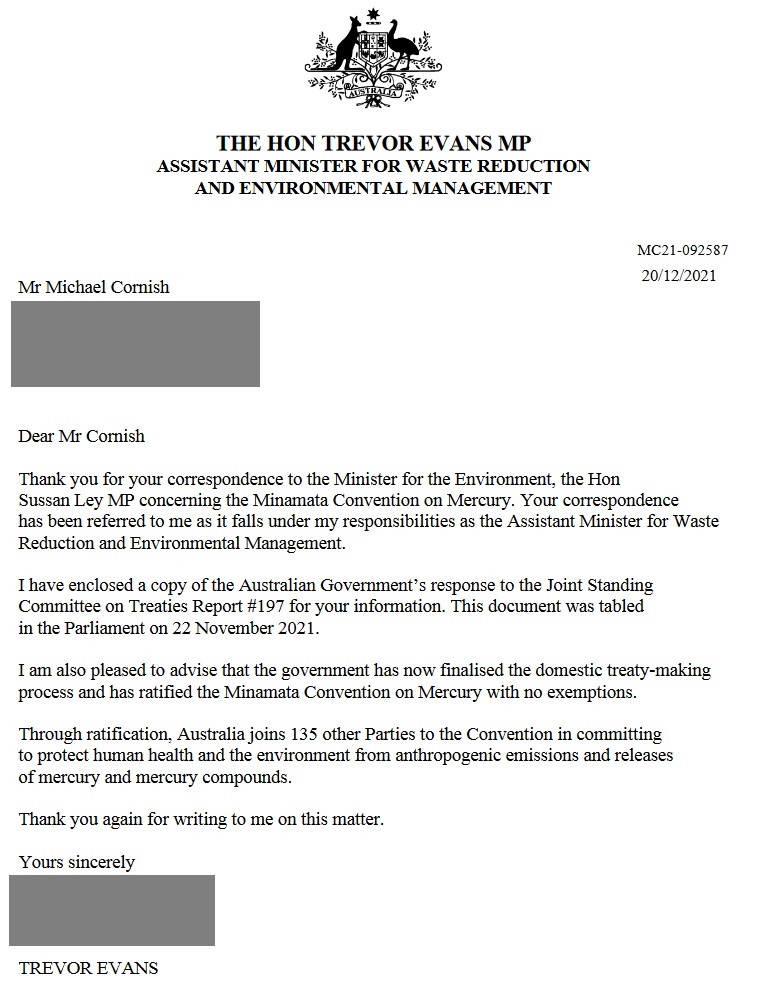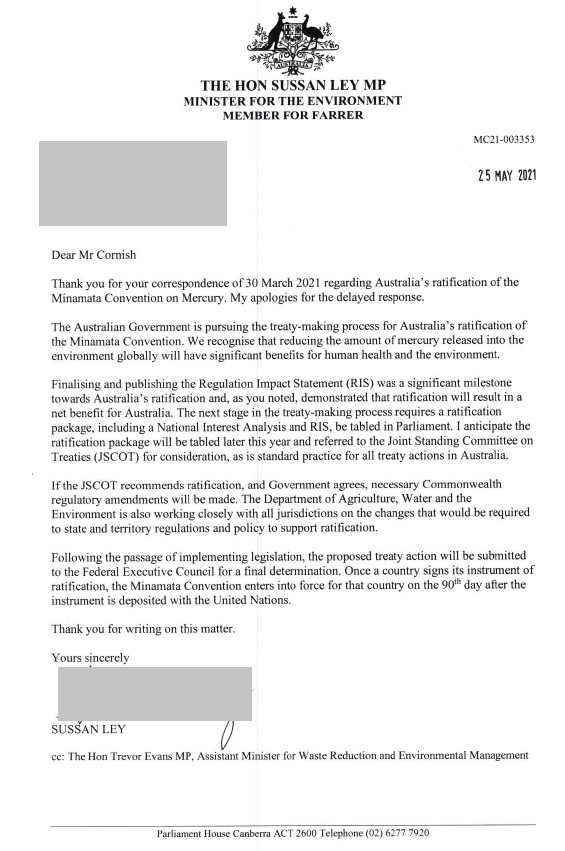Committee Secretary
Joint Standing Committee on Treaties
PO Box 6021
Parliament House
Canberra ACT 2600
e: [email protected]
Dear Committee
RE: Submission to the Minamata Convention on Mercury Inquiry
I write to you as a former Senior Policy Adviser to Rebekha Sharkie MP who had carriage of the environment portfolio for Centre Alliance.
Australia is to be congratulated for signing the Minamata Convention on Mercury in October 2013.
The Convention is a global treaty to protect human health and the environment from the adverse effects of mercury. Mercury is a heavy metal that cycles between the atmosphere, ocean and land, and can be toxic to humans and wildlife. According to the booklet of the Convention, “[m]ercury is recognised as a substance producing significant adverse neurological and other health effects, with particular concerns expressed about its harmful effects on infants and unborn children.”[1]
Australia is one of the few developed nations yet to ratify this important treaty.
The Convention is named after Minamata disease, itself named for the poisoning of the Japanese community in Minamata Bay that resulted from eating shellfish and fish containing methylmercury (an organic mercury compound) accumulated from industrial wastewater. Signs and symptoms of Minamata disease include ataxia, numbness in the hands and feet, general muscle weakness, loss of peripheral vision, and damage to hearing and speech. In extreme cases, insanity, paralysis, coma, and death follow within weeks of the onset of symptoms. Whilst conventional mercury poisoning is less severe, it can lead to serious burns; skin-shedding; kidney dysfunction; itching; hair, teeth and nail loss; hypertension, and more besides.
Whilst Australia’s mercury emissions have reduced greatly in recent years due to the deployment of mercury emission reduction technology in key gold-mining processing plants, Australia’s per capita mercury emissions remain higher than the global average[2] as they are insufficiently regulated. More still needs to be done across other sectors, including the production of other metals, fossil fuel combustion, and intentional use and waste.
It is excellent news that the Government has now published its Regulatory Impact Statement (RIS) on the Ratification of the Minamata Convention on Mercury[3] and has now referred the ratification of the Convention to the Committee. The RIS found that there will be no regulatory burden on business or the community, as existing regulatory frameworks broadly align with international obligations under the Convention. Ratification was calculated to provide a net benefit of over $5.9 million over 20 years, and this direct economic benefit will be accompanied by a range of additional social and environmental qualitative benefits.
Furthering the case for ratification, the National Interest Analysis provided to the Committee summarises several compelling reasons for rapid ratification that are worth highlighting, specifically:
“10. Collective global action under the Minamata Convention is the most effective means of protecting Australians from the harmful effects of mercury pollution…
- Due to the widespread adoption of the Convention… ratification would have a low impact on Australian business and industry…
- …several rounds of public and targeted consultation have confirmed broad [domestic] support for ratification and have not identified any significant risks or disadvantages.
- The impetus to ratify now is strong, with business and industry keen for certainty about mercury controls in Australia and for alignment with trading partners…
- Australia is currently unable to fully engage in or guide the direction of the associated scientific and technical bodies to the Convention, and cannot vote on decisions regarding future global controls. Ratification will provide Australia with a seat at the negotiating table, enabling us the opportunity to influence the future direction of the Convention.”[4]
Importantly, the procedural barriers to ratification are also minimal, with the National Interest Analysis concluding that “…ratification can proceed with only minor legislative and policy amendments across all jurisdictions”[5].
In conclusion, I provide two recommendations to the Committee, namely:
Recommendation 1: That the Committee recommend the ratification of the Minamata Convention on Mercury.
Recommendation 2: That the Federal Government finalise the minor legislative changes required to effect ratification by no later than the end of 2021.
Thank you for your time and consideration of my submission.
Yours sincerely,
Michael Cornish
16 / 7 / 2021
[1] UN Environment Programme, Minamata Convention on Mercury – Text and Annexes, September 2017, https://www.mercuryconvention.org/Portals/11/documents/Booklets/COP3-version/Minamata-Convention-booklet-Sep2019-EN.pdf
[2] UN Environment Programme, Technical Background Report for the Global Mercury Assessment, 2013, https://www.amap.no/documents/doc/Technical-Background-Report-for-the-Global-Mercury-Assessment-2013/848
[3] See: https://ris.pmc.gov.au/2021/03/04/ratifying-minamata-convention-mercury
[4] p2, National Interest Analysis: Category 1 Treaty, Minamata Convention on Mercury, Department of Foreign Affairs and Trade, 2021
[5] Ibid.


